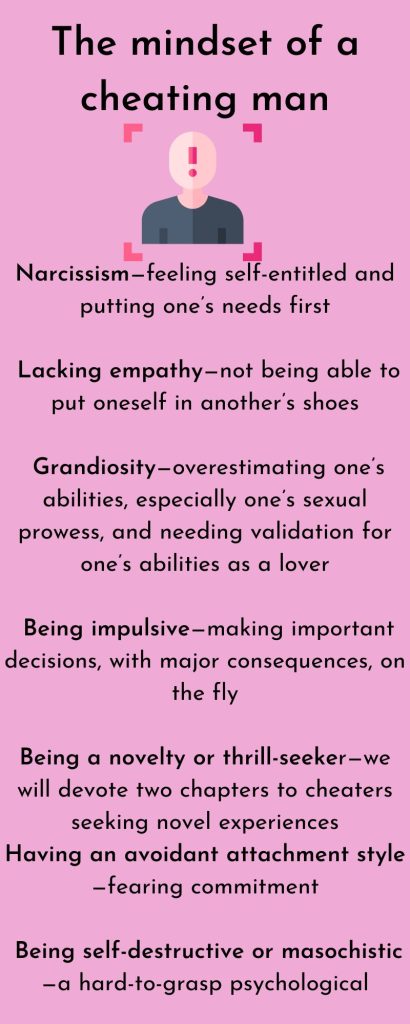
The mindset of a cheating man: what you need to know about infidelity in marriage
Men usually cheat in a delusional fog.
They believe that cheating can bring them better sex, lift their spirits, and boost their sagging self-esteem.
And a few of them still hope to find “true love”.
No one wants to know that very often, cheating ends up wrecking multiple relationships and actually eroding a man’s confidence and sense of self.
We can’t say much about infidelity before defining it.
Let’s define what is infidelity.
Infidelity definition
Infidelity is the act or fact of having a romantic or sexual relationship with someone other than one’s husband, wife, or partner.
/Merriam-Webster Dictionary/
https://www.merriam-webster.com/dictionary/infideli
A man who is considering or engaging in infidelity may have several motivations.
Some possible factors that can contribute to a specific mindset of the cheating man include:
- Boredom or feeling unfulfilled in the relationship: If a man feels that his relationship has become stagnant or unsatisfying, he may seek excitement and novelty outside of the relationship.
- Low self-esteem: A man with low self-esteem may cheat as a way to boost his confidence and self-worth.
- Lack of emotional intimacy: If a man feels that his emotional needs are not being met in the relationship, he may seek connection and validation from someone else.
- Opportunity: A man may cheat simply because the opportunity presents itself, without having any underlying emotional or relationship issues.
- Desire for power or control: A man may cheat as a way to assert dominance or control in the relationship.
- Addiction to the thrill of infidelity: Some men may become addicted to the thrill and excitement of cheating and continue to engage in it despite the consequences.
It’s great to understand that these are not the only possible factors that can contribute to a man’s decision to cheat and each individual case is different.
Sexual Infidelity vs. Emotional Infidelity
Sexual infidelity is usually understood as a violation of the expectation of your sexual exclusivity and can be as minor as a kiss or as significant as sexual intercourse.
Experts and researchers usually define infidelity as a major sexual transgression, requiring a minimum of genital contact.
Emotional infidelity implies an intense emotional bond with a fair amount of sexual tension and desire.
Often the most powerful affairs are those that are both emotional and sexual.
Studies have repeatedly shown that women perceive emotional infidelity to be near as threatening to their relationships as physical affairs.
Men, meanwhile, tend to worry more about sexual betrayals.
Infidelity can come from a variety of social circumstances and situations.
I have met some married guys who cheat despite the fact that they are happy with their spouses.
In surveys over half of the cheating men reported that they were perfectly content with their long-term relationships and cheated despite their satisfaction.
So who can cheat? Anyone! Anytime! Anyplace!

Causes of Infidelity in marriage
Dr. Kenneth Rosenberg has found three main factors that determine the mindset of a cheating man:
- Brain—the neurological structures and chemistry that evolution gave you
- Psychology—the mind that you’ve developed through formative experiences that imprint certain ways of thinking about the world, your place in it, and how you think about your sexual/romantic self
- Culture -the environment, with its various messages about sex, love, and adultery, which shape opinions and opportunities for infidelity.
Studies say, that nearly 50 percent of what differentiates cheaters from noncheaters has to do with biological differences in their brain chemicals.
This means that more than half of what pushes a man to cheat has to do with both one’s environment and one’s psychology.
The most significant environmental cause is the fact that man can cheat.
The easier it is to do, the more likely they will do it.
Cheating is not confined to sleazy guys.
Under the right circumstances, it is very easy to turn lustful thoughts into desperate actions.
As we know from studies of chemical addictions, there are several environmental factors that make bad behaviors more doable. Professionals refer to these as the three A’s. If bad behavior is affordable, accessible, and anonymous, men are more likely to do it.

The Psychology of a Cheater: Unmasking the Traits
Behind every act of infidelity lies a complex tapestry of psychological factors. By delving into the depths of a cheater’s mind, we aim to unmask the traits that contribute to their actions. Prepare to be captivated by the emotional landscape that drives individuals toward betrayal, as we shed light on the intricate psychology behind infidelity.
- Narcissism: The Allure of Self-Admiration
Narcissistic tendencies play a significant role in infidelity. Studies show that individuals with high levels of narcissism are more likely to seek validation and attention outside their committed relationships.
A staggering 70% of cheaters exhibit narcissistic traits, driven by an insatiable need for admiration and a sense of superiority.
- Lack of Empathy: The Emotional Disconnect
A striking characteristic of cheaters is their reduced capacity for empathy. They struggle to comprehend and respond to their partner’s emotional needs, leading to disconnection within the relationship.
Empathy deficits are observed in 83% of individuals engaged in infidelity, highlighting their inability to fully understand and address the emotional consequences of their actions.
- Grandiosity: Craving the Spotlight
Cheaters often display grandiose traits, craving attention, admiration, and validation. They seek excitement and validation outside their committed relationships to feed their egos.
Around 68% of cheaters exhibit grandiose tendencies, finding solace in a narrative where they are the center of attention and desire.
- Impulsiveness: Succumbing to Temptation
Impulsivity plays a pivotal role in infidelity, leading individuals to act on their desires without considering the consequences. The need for immediate gratification overrides long-term commitment.
Approximately 72% of cheaters have a tendency towards impulsive behavior, succumbing to momentary urges and neglecting the emotional impact on their partners.
- Novelty-Seeking: The Thrill of the Forbidden
The allure of novelty often entices cheaters into seeking new experiences outside their relationships. They become captivated by the excitement of the forbidden, seeking emotional or physical connections elsewhere.
A staggering 87% of cheaters exhibit a high degree of novelty-seeking behavior, constantly yearning for new sensations and experiences.
- Avoidant Attachment Style: Fear of Intimacy
Cheaters with an avoidant attachment style struggle with emotional intimacy, distancing themselves from vulnerability and closeness. They seek temporary connections to avoid deeper emotional bonds.
Approximately 65% of cheaters exhibit an avoidant attachment style, using their detachment as a shield against emotional pain and commitment.
- Self-Destructive Tendencies: Inner Turmoil
Infidelity often reflects deep-seated emotional turmoil within the cheater. Self-destructive tendencies, such as self-sabotage and a desire to escape emotional pain, drive them toward betrayal.
A significant number of cheaters, around 77%, exhibit self-destructive tendencies, using infidelity as a means to alleviate their inner struggles.
The psychological factors associated with infidelity paint a vivid portrait of the complex inner world of a cheater. Narcissism, lack of empathy, grandiosity, impulsiveness, novelty-seeking, avoidant attachment style, and self-destructive tendencies intertwine to create a web of emotions and motivations that lead to betrayal. By understanding these traits, we gain insight into the intricate psychology behind infidelity, emphasizing the importance of self-reflection, open communication, and emotional growth in fostering healthy, committed relationships.

What Surveys tell us about Infidelity in marriage
Infidelity is often cited as the major cause of divorces in the United States, blamed for untold numbers of suicides, and understood to be the root of much unhappiness. But for those who want to stay married after a relationship transgression, it’s helpful to know that there is a silver lining to the statistics.
Your relationship does not need to end if you can figure out how to communicate and collaborate after the discovery of infidelity.
Although infidelity may be the event that causes a traumatic rupture to the relationship and can throw an unsuspecting partner into despair, it is not the act of infidelity per se that destroys the couple.
Remember, relationships end when you fail to communicate openly when you struggle with uncertainty about your relationship, and lack the commitment to make your marriage work.
And when you are unable to bridge the gap after discovering that you have “grown apart.”
These are the issues that prevent repair and reconciliation after the discovery of affairs, and acknowledging these particular issues is the first step toward resolving them.
There are plenty of infidelity stats
Here are some key points.
In 2015 the polling site YouGov surveyed about a thousand Americans and reported that 20 percent of men admitted to cheating on their wives.
27 percent of women said they have taken back a partner after discovering infidelity.
According to a survey, 35 percent of women were upset by sexual infidelity and 46 percent of women were upset by emotional infidelity.
Interesting facts about cheating
European men and women are more likely to cheat than Americans.
Frequent-flyer business travelers are more likely to cheat than those who don’t travel for work.
In fact, given that summertime is the peak season for travel, it also becomes a time for new lovers, with the summer months being the peak period for cheating.
Infidelity is not sanctioned by society:
90 percent of people consider sexual infidelity immoral,
and 65 percent consider it unforgivable.
In the past male philandering was more acceptable.
Since the mid-1970s the General Social Survey of the National Opinion Research Center’s (NORC) Center for the Study of Politics and Society has been monitoring attitudes towards sexual behaviors (including infidelity) among a representative sample of nearly thirty-seven thousand Americans.
According to their most recent findings, which may contain the most scientific data about infidelity in marriage, the number of married men who have ever cheated has remained stable at around 20 percent since 1993.
The General Social Survey actually shows higher disapproval of infidelity today than in the 1970s.
Interesting fact – For men over sixty cheating has increased since 1991 by 14 percent.
Among Dr. Kenneth Rosenberg’s male patients, the surprising reality is that the vast majority have cheated by the age of sixty.
He treats a fair number of middle-aged patients, between the ages of forty and sixty, which is precisely the age range when men are most likely to cheat.
What do cheating husbands think about their cheating?
They often minimize their dalliances, even with themselves.
They ignore the make-out session with the old flame at the high school reunion.
They don’t count the affair as cheating if the adulterous relationship turns into a second marriage.
They say it didn’t count because we were drunk.
They say strip clubs and naked women grinding on their genitals till orgasm didn’t count because they were just blowing off steam with the guys.
Or they say things like the now-famous words of our philandering former president who allegedly received oral sex, but did not have vaginal intercourse, “I did not have sexual relations with that woman!”
Life Circumstances That Lead to Cheating
Studies tell us there are associations between cheating and life situations.
There is conflicting data about the impact of age, with some surveys claiming forty-nine to be the peak age of male cheating, and other studies claiming thirty-nine years of age for men.
Personally, I think the risk is more dependent on commonsense factors like how long a couple has been married, where they are in their careers and with raising children, what their health and hormonal levels are like at various ages, and what is happening to them and among their peers in their community at any particular phase in their life cycle.
Neuroscience and Infidelity
One of the more fascinating contributions to understanding sex comes from emerging studies in neuroscience. Many marriage and relationship experts don’t understand this biology very well, but nonetheless, apply the results from a few rat studies to humans and, as a result, exaggerate the findings.
Other experts, meanwhile, do the opposite: they ignore the studies and call them “uninteresting” because neuroscience is beyond their understanding.
Some people seem to find the idea that chemicals determine human behavior to be creepy and hate the notion that their motivations can be understood by a set of predictable chemical reactions occurring in the brain. But the new neuroscience of sex and monogamy is fascinating. It’s worth understanding.
Anatomy – is it destiny or not?
“Anatomy is destiny,” wrote Sigmund Freud in his 1912 paper on the nature of romantic love. Freud was a strong believer that gender determined our thoughts and desires. Now, more than a hundred years later, scientists have found evidence of the actual biological mechanisms that contribute to our sexual desires.
We are born with genetic factors that cause chemical changes and influence our sexual thoughts and behaviors.
A second and maybe even more interesting piece of new information is that not only do your genes influence your behavior, but also your behaviors and thoughts can actually change your genes and your brain.
We have feedback loops—interconnections between biology, psychology, and culture—and when we experience a certain successful pattern of behavior for getting sex, it can forge a pathway in our brain, creating a channel we travel over and over.
These paths become deeply ingrained in our gray matter (where our brain cells, or neurons, reside) and act as the favored patterns for our actions. Memories become physiologically locked in our minds through chemical reactions.
Like a path in an overgrown forest, how we think about, seek out, and ultimately find sex creates a biological imprint in our brains, and it becomes difficult to venture off the established way that has brought us so much pleasure.

Chemistry of Affair
Affairs are also about chemistry. In fact, most people would say that the physical chemistry of the affair is the most important element because there is little sharing of familial duties and less time for chitchat. No time for long dinners, quiet evenings on the couch after the kids are asleep, or social engagements with family or friends. An affair often centers around sex, leaving aside other typical romantic activities.
So, naturally, sexual affairs are more about sexual chemistry than long-term relationships are, right?
Imagination and desire for an Affair
Absolutely not. In truth, affairs usually involve spending less time with an actual, real, live human and more time with the person that we’ve conjured up from our yearnings, our hopes, our fantasies and fears, and from what psychiatrists call our “internal representations” of another.
Affairs are actually built not in the bedroom, but in the mind. Concocted in our irrationally exuberant and sometimes desperate imaginings, affairs draw their power from deep wants and needs. Their magnetism has its roots in desire.
Boring sexual life
An average couple engages in sex for under six minutes. Men’s orgasms last for less than five seconds on average.
Sex lasts minutes. Orgasms last seconds. But men can maintain their fantasies for a lifetime.
Fantasy is the flame of passion.
Cause of infidelity in marriage: Looking for Desire
Desire has a way of getting us engaged, keeping us in a zonked-out zone, getting lost in lust and love, and, in some cases, blinding us to self-destructive choices.
Today psychology and medical professionals say that the desire phase, deeply rooted in the psyche and the most psychologically complex, is the most pivotal.

A cheating man is looking for a novelty
Novelty Creates Desire in the cheating man’s brain
The New Rat in the Cage
Newness is intoxicating, literally. In fact, the pursuit of novelty is one of the most basic, primitive desires, which has been demonstrated in a multitude of different species, including rats.
The New Rat in the Cage
Drop a male rat into a cage with a female rat who’s in heat, and the two will copulate repeatedly until sexual exhaustion. Drop a brand new rat into the cage and, despite the other rats’ exhaustion, both male and female rats will rally to resume mating activity with the new partner. The new rat in the cage gets all the attention, despite the original rat’s disinterest in any additional sex with the previous mate. This phenomenon (called the Coolidge effect after a joke about then-President Calvin Coolidge and his wife) is an ancient biological program aimed at seizing genetic opportunities, driven by a neurological mechanism whereby potent brain chemicals jolt a “sexually satiated” animal to continue to copulate. The appeal of a new mate over a pre-existing mate can be seen in both males and females up and down the phylogenetic spectrum, from beetles to primates.
Why do guys cheat even if they love you?
Many men stray despite having spouses whom they desire and with whom they often enjoy great sex lives. They stray despite the fact that they are already paired with a perfectly good woman.
And if and when they divorce, the wife they dismissed like yesterday’s bad news becomes someone’s new perfect find.
Some of the cheating husbands succumb to each new opportunity or, to put it more crudely, each new rat in the cage.
They’re forever seeking someone new. Affairs of the heart and journeys of sexual desire take over the reward centers of their brain, and new sex and love further cloud or subvert the decision-making abilities of their brain’s frontal lobes.
Forbidden fruit
One of the reasons a cheating husband finds romance so enticing is that it is secret and forbidden. In fact, the offense itself is part of the prank – at least until guilt arises. Sociologists have recognized that adrenaline makes the heart more loving.
Desire often has more to do with a man’s own feelings, his mental representations of another, and the context of a new encounter than with the desired woman herself.
When a cheating man meets a new lover, he says, “I don’t know—she just excites me in a way my wife just can’t. I just married the wrong woman!”
He ignores the adrenaline of this forbidden chance encounter, the uncertainty of her desire for him, the pulse of the new music, the exotic new cocktail he’d ordered, and the unseen corners at the darkened bar.
Instead, man attributes his desire to the new person.
He compares the new woman to his old wife.
Although a cheating husband might not realize it, the thrill of the new, fueled by the brain’s novelty-seeking chemicals, is making his heart grow fonder.
New reality creates new possibilities for cheating
Internet porn, orgies, threesomes, cybersex, BDSM, and novelty—these desires open up worlds of anticipation, lust, and fantasy. And they are often the longings that propel men toward infidelity.
Want to know more about the Mindset of a cheating man?
Highly recommended to read this book: Infidelity: Why Men and Women Cheat, 2018 by MD Kenneth Paul Rosenberg
Mindset of a cheating man: a true story
Patrick and Emily had been married for 18 years when Patrick first cheated on his wife.
Patrick’s mother had just died and he got depressed and angry in his pain.
Emily was very critical of Patrick’s reaction to his mom dying, saying, “You have to be strong for the family.”
In fact, Emily was constantly critical of her husband in their everyday life and viewed this as a normal part of marriage.
She said she didn’t want “to give Patrick a big head,” so she rarely encouraged him.
Patrick tried to hide his tears for fear of being mocked and felt ashamed that he wasn’t stronger for his wife and family.
The more he shoved his feelings down, the more depressed he became. Then along came Monica, a family friend, and neighbor who said she understood how he felt because she had just lost her mother and he could come over and cry with her anytime.
Patrick did begin spending time with Monica, and she eventually initiated a sexual relationship. He says he never saw it coming and felt like he couldn’t say no without embarrassing her and losing her friendship. The truth is, he didn’t want to say no. What started out as a shocking and guilt-filled experience ended up becoming an obsession. Monica filled a huge void for him, and he couldn’t get enough.
The affair finally ended because Mark’s guilt became too much. He ended up confessing the entire thing to his wife and vowed never to do it again.
Emily was devastated and humiliated and responded with anger and contempt. Her husband asked for forgiveness, but her criticism and contempt knew no bounds. Patrick tried to make it up to her and accepted her anger as just punishment for his sin, but he was miserable and didn’t feel any love for Emily anymore.
Patrick tried desperately to white-knuckle it through a miserable marriage, but then he fell off the wagon again. This time it was with a woman who pursued him at his workplace. Sally was much younger than Patrick, and she looked up to him and flattered him. Patrick was able to share his heart and his pain with her, and his discontent in his marriage became the center of many of their conversations.
“This is often how inappropriate relationships begin,” says Dave Carder, author of Torn Asunder: Recovery from an Extramarital Affair:
“People move from talking in generalities to more specific things, like ‘help me understand my spouse’ to even more private issues. This starts a gradual erosion of boundaries and often leads to an affair.”
Patrick and Sally had a very intense friendship and emotional connection.
“If your heart races when you anticipate seeing this person, that is a definite sign there is more to the story than friendship,” says Carder. “If you have said or thought to yourself, ‘If I weren’t married, I would marry this person,’ that definitely puts the relationship in a different category. This is often when you see people acting like they are drunk in love.”
An affair can be life-shattering
If your spouse has been unfaithful, it can leave you feeling angry, depressed, disoriented, or even enraged.
You may find yourself obsessed with knowing every little detail of the affair. The betrayal and deception can leave you numb or feeling wildly out of control.
You may suffer from anxiety, depression, low self-esteem, humiliation, or guilty feelings that you could have somehow prevented this affair from happening.
This is exactly how Emily felt when Patrick confessed to his first affair. She was angry, depressed, and humiliated. She swung between wanting to kill her husband and feeling somehow responsible and inadequate.
She was absolutely blindsided because she had always thought they had a great marriage.
This woman often bragged that her husband would never leave her or be unfaithful and that they had a great sex life.
Emily didn’t think about divorce after her first affair.
But after the second?
She was done.
Her only reason for attending was to parade Mark’s infidelity in public.
She did not want to look at all the aspects that make up the profile of their marriage – her husband is simply to blame for everything.
We may be heartbroken, but we also know that if both spouses are not ready to give everything one hundred percent, the chances of rebuilding the marriage are slim.
If you or your partner has been unfaithful, you are not alone.
One in every 2.7 couples is affected by infidelity.
According to a published report in the Journal of Couple & Relationship Therapy, by the age of forty, approximately fifty percent of all wives and sixty percent of all husbands will have had an extramarital affair.
In the case of Patrick and Emily, Patrick’s affairs had an absolutely catastrophic effect on the family. But we can’t consider an affair an automatic marriage killer.
Remember, If you are two willing partners, a marriage can be rebuilt from the bottom up.
And if kids are involved, always recommend trying to repair the relationship. Despite being raised in a poisonous atmosphere is even worse, children suffer greatly from divorce, and you have a responsibility to take every opportunity to repair the relationship before giving up and filing for divorce.
FAQ Section
Question: Why do some men cheat on their partners?
Answer: It can be incredibly painful to discover that your partner has been unfaithful. It’s important to remember that every situation is unique, and there’s no one-size-fits-all answer. Some men may cheat due to feelings of dissatisfaction or boredom in the relationship, while others may seek novelty or excitement. Issues with commitment or intimacy, as well as struggles with self-control or impulse regulation, can also contribute to infidelity.
Question: Can a cheating man change his ways and be faithful in the future?
Answer: It’s understandable to feel hurt and skeptical about the possibility of change after experiencing infidelity. However, it is possible for a cheating man to transform his behavior and become faithful in the future. This often requires deep self-reflection to understand the reasons behind the infidelity, a genuine willingness to take responsibility for his actions, and a commitment to personal growth and self-improvement. Rebuilding trust and repairing the relationship will take time and effort from both partners.
Question: Is cheating always a sign that a man no longer loves his partner?
Answer: Discovering that your partner has cheated can leave you feeling devastated and questioning the love in your relationship. However, it’s important to remember that cheating does not always mean a man no longer loves his partner. While infidelity can be a sign of disconnection or dissatisfaction, it can also stem from other factors such as personal insecurities, unresolved trauma, or compulsive behavior. Open and honest communication with your partner is crucial to understanding the underlying issues.
Question: How can I tell if my partner is cheating on me?
Answer: Discovering that your partner may be cheating on you can be an incredibly painful and confusing experience. It’s important to look for signs that might indicate possible infidelity, such as increased secrecy or defensiveness, changes in behavior or routine, unexplained absences or unusual communication patterns, and emotional distancing or disengagement. However, it’s crucial to approach the situation with empathy and understanding. Remember that these signs alone are not definitive proof, and it’s always best to communicate openly and honestly with your partner to address any concerns or suspicions you may have.
Question: Should I forgive a cheating partner?
Answer: Discovering that your partner has been unfaithful can cause a whirlwind of emotions, leaving you questioning whether forgiveness is possible. Forgiveness is a deeply personal choice that can depend on various factors, including the nature of the infidelity, the strength of the relationship, and the willingness of both partners to work on repairing the damage caused by the cheating. While forgiveness can be a powerful tool for healing and moving forward, it is not always easy or necessary. It’s essential to prioritize your own well-being and emotional health in any decision you make. Seeking guidance from a trusted counselor or therapist can also provide valuable support in navigating through this difficult situation.
- “So, What Did You Do Last Night? The Economics of Infidelity,” by Bruce Elmslie and Edinaldo Tebaldi, 2008.
- “The General Social Survey,” GSS, http://gss.norc.org.
- M. Mullinax, K. J. Barnhart, K. Mark, D. Herbenick, “Women’s Experiences with Feelings and Attractions for Someone Outside Their Primary Relationship,” Journal of Sex and Marital Therapy, 2016








I distrusted my husband of cheating for a long time, his attitudes were enough to raise suspicions but I needed to be more convinced, a friend recommended spyloop to me and i contact him immediately, in few days this hacker got me access to my husband’s phone without touching the phone, i was able to monitor his illicit activities; his phone calls, text messages, whatsapp, snapchat, facebook, hangouts and even on social media apps. He got me enough evidence to file for divorce. spyloop is such a reliable hacker and your job is safe with him. He has so many other services to render such as Clearing of Bad Credit Report, Credit top-up, Increase your school Grades, Monitor your Children’s online activities, Retrieve your lost bitcoin, your lost accounts and so on.. Contact him on HACKSECRETE@GMAIL.COM .. whatsapp or text him on +1 (774) 202-9445 . Thank me later.
Top ,.. top top … post! Keep the good work on !
you’re really a good webmaster. The website loading speed is amazing. It seems that you’re doing any unique trick. Moreover, The contents are masterwork. you’ve done a excellent job on this topic!
Top site ,.. amazaing post ! Just keep the work on !
You have a great site and content, I’m glad you liked it here. 51889842